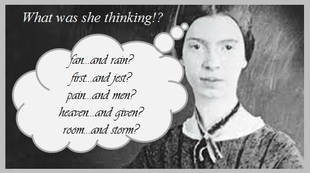
Dickinson (Emmett Lee, that is) was certainly flattered -- though research indicates he thought her poetry was "without proper control," especially when it came to rhyme.
In his poem "Reflect on Rhyme, with kindly ears," he makes reference to his third cousin's failed attempts at rhyme in many of her poems.
In 'Hope' is the thing with feathers," Emily Dickinson rhymed "soul" with "all." In "I'll tell you how the sun rose," she rhymed "time" with "ran." In "The soul selects her own society," she paired "one" with "stone" and "gate" with "mat." There are countless other examples of slant or lazy rhymes (including all of the examples shown in the picture above).
In Emmett Lee Dickinson's tribute to Emily's botched attempts at rhyme, he very cleverly poked fun at her by rhyming "best" with "missed":
Reflect on Rhyme, with kindly ears –
She doubtless did her best –
Still softly rings her warbling tone
Though Echoes might be missed –
His poem inspired third cousin Emily to pen "Look back on Time, with kindly eyes":
Look back on Time, with kindly eyes –
He doubtless did his best –
How softly sinks that trembling sun
In Human Nature’s West –
Interestingly enough, Emily Dickinson originally ended her poem with "In Human Nature's east" -- until Emmett Lee Dickinson pointed out to her that she could use "west" to rhyme with "best" in the second line of the poem.
 RSS Feed
RSS Feed
